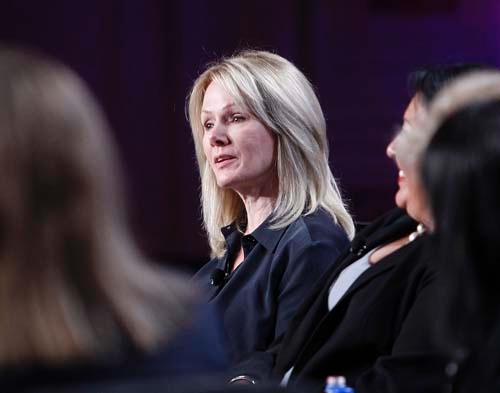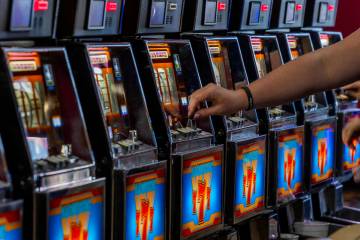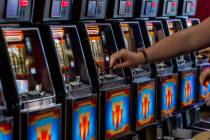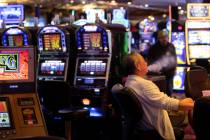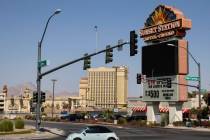IGT leaders: Proxy fight would be step in wrong direction
Allowing a former chairman of International Game Technology to win three seats on the slot machine manufacturer's board in a proxy fight "would be a step in the wrong direction," the company's top executives told the company's shareholders Monday.
In a letter to shareholders, IGT Chairman Phil Satre and Chief Executive Officer Patti Hart outlined the company's financial performance over the past four years. In a bullet-point presentation, the pair said Las Vegas-based IGT "is both strategically and financially sound" and "is positioned for sustained growth through continued investment in its core electronic gaming business and disciplined investments in related business opportunities and new markets."
In an interview Sunday evening, Hart, IGT's CEO since April 2009, said she had to "deal with the repercussions" of the decisions and direction taken by the company's previous management, which caused IGT to lose more than $6.6 billion of market capitalization, a 70 percent decline between 2004 and 2009.
"My assignment was to come in and make the company efficient and get the company fixed," Hart said. "You don't always make friends that way."
Hart, who has been on IGT's board since 2006, is seeing her leadership challenged in a proxy fight led by Jason Ader, the principal in New York-based Ader Investment Management, and former IGT Chairman and Chief Executive Officer Charles Mathewson.
In preliminary proxy filing with the Securities and Exchange Commission on Friday, Ader Investment said it would nominate Mathewson and two others for election to IGT's board at the upcoming annual shareholders meeting in an effort to change the company's direction.
Ader Investment controls more than 8 million shares of IGT, or roughly 3 percent of the company. The SEC is expected to rule in the next few weeks on Ader's proxy and on whether he can communicate with IGT shareholders.
Satre and Hart encouraged shareholders to re-elect the company's eight-person board, saying the current management "is delivering the strong and improving financial results that the board expects from the successful execution of its strategy."
The letter also stated that Ader and Mathewson "seek to advance an agenda that would not be in the best interests of all IGT shareholders, advocated a return to a dated business model," and that they "lack credibility and are not suitable to represent shareholders."
Ader Investment declined to comment on IGT's statement, saying the company is in an SEC-regulated quiet period. However, Juda Engelmayer of New York-based 5WPR, who serves as an outside spokesman for Ader, said the IGT statement "conveys a sense of panic."
"Their anxiety over the proxy challenge only deepens the urgency for new leadership on the management and board," Engelmayer said.
Ader met with Hart and IGT Chief Financial Officer John Vandemore in Las Vegas on Sept. 19 to outline his concerns with IGT's direction. Vandemore met with Ader in New York on Oct. 10. Ader also conducted a 30-minute conference call with the IGT board on Nov. 15.
Hart said Ader's presentation contained "a number of graphs and charts" but lacked substance.
"There was not really a plan to address the structural issues within the industry," Hart said. "They didn't have a plan, just a lot of criticism."
Hart said she never intended to publicly criticize former IGT CEO T.J. Matthews, whom she replaced when he resigned in 2009. However, the letter to shareholders said Matthews "implemented a flawed product and acquisition strategy, and failed to address an unsustainable cost structure, even in the face of the greatest industry downturn on record."
During Matthews' tenure, IGT's total revenues declined 15 percent and operating income fell 56 percent, according to the shareholder letter.
IGT was also forced to cut roughly 1,000 jobs since 2009. The layoffs began when Matthews was CEO but most came after Hart took over.
"That was not an easy decision, but since 2009 we have prudently allocated capital to drive growth and return capital to shareholders," Hart said.
In 2012, IGT said it increased total revenues by more than 10 percent, to $2.1 billion, while the company's fourth-quarter revenues were the highest in four years. Revenues from sale of slot machines to casinos in North America were the highest in eight years during the quarter.
Hart said the gaming industry has slowed its growth since 2008, and that IGT shareholders can expect to see annual 10 percent increases in the number of slot machines on casino floors.
IGT also told shareholders it invested some $800 million into research and development over the past four years and has "strategically deployed $750 million in capital to enhance" its slot machine business.
In the past three years, IGT has returned more than $860 million to shareholders, including $546 million in fiscal 2012.
In the interview, Hart defended the company's $115 million 2011 purchase of Swedish online gaming provider Entraction. IGT shut down Entraction's operations last summer after running into regulator concerns about websites in several Eastern European jurisdictions. IGT plans to use Entraction technology in legal online gaming markets.
Hart said IGT wrote off "just $15 million" in conjunction with Entraction.



